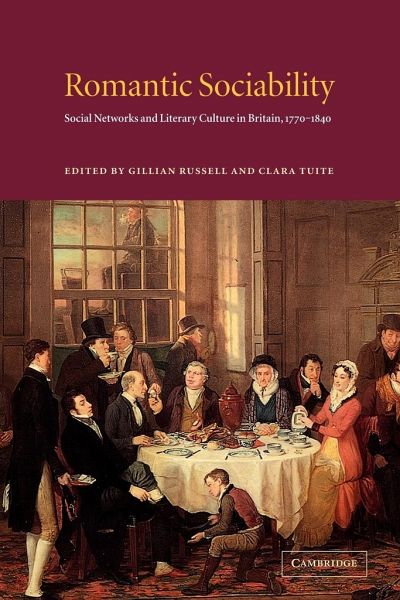
Romantic Sociability
Social Networks and Literary Culture in Britain, 1770 1840
Herausgeber: Russell, Gillian; Tuite, Clara

PAYBACK Punkte
27 °P sammeln!
Explores the often overlooked social networks of Romantic figures.Challenging the assumptions which underlie an understanding of the 'Romantics' as solitary and anti-sociable, and Romanticism as representing the rejection of Enlightenment sociability, this volume introduces sociability to the field of Romantic literary and cultural studies. The volume engages with Jurgen Habermas' model of the 'public sphere' which emphasizes the coffee-house and club as models of an older, masculine eighteenth-century sociability, and focuses on the changing nature of sociability in British radical culture of...
Explores the often overlooked social networks of Romantic figures.
Challenging the assumptions which underlie an understanding of the 'Romantics' as solitary and anti-sociable, and Romanticism as representing the rejection of Enlightenment sociability, this volume introduces sociability to the field of Romantic literary and cultural studies. The volume engages with Jurgen Habermas' model of the 'public sphere' which emphasizes the coffee-house and club as models of an older, masculine eighteenth-century sociability, and focuses on the changing nature of sociability in British radical culture of the 1790s and on the gendered nature of sociability. In a range of essays which examine modes of sociability as diverse as circles of sedition, international republicanism, Dissenting culture, Romantic lecturing, theatre, and shopping, the volume transforms our understanding of Romanticism by exploring the social networks of such central Romantic figures as Anna Barbauld, Frances Burney, Samuel Taylor Coleridge, William Godwin, William Hazlitt, Anne Lister, Robert Merry, Joseph Priestley, John Thelwall and Mary Wollstonecraft.
Review quote:
'[a] rich collection of essays -'. British Association of Romantic Studies Bulletin
Table of contents:
Acknowledgements; 1. Introducing Romantic sociability Gillian Russell and Clara Tuite; 2. Sociability and the international republican conversation Margaret C. Jacob; 3. 'Equality and no king': sociability and sedition; the case of John Frost James Epstein; 4. Amiable and radical sociability: Anna Barbauld's 'free familiar conversation' Anne Janowitz; 5. Firebrands, letters and flowers: Mrs. Barbauld and the Priestleys Deirdre Coleman; 6. 'Reciprocal expressions of kindness': Robert Merry, the Della Cruscans, and the limits of Romantic sociability Jon Mee; 7. Spouters of washerwomen: the sociability of Romantic lecturing Gillian Russell; 8. Hazlitt and the sociability of theatre Julie A. Carlson; 9. 'Obliged to make this sort of deposit of our minds': William Godwin and the sociable contract of writing Judith Barbour; 10. The Byronic woman: Anne Lister's style, sociability and sexuality Clara Tuite; 11. Counter publics: shopping and women's sociability Deidre Shauna Lynch; Bibliography; Index.
Challenging the assumptions which underlie an understanding of the 'Romantics' as solitary and anti-sociable, and Romanticism as representing the rejection of Enlightenment sociability, this volume introduces sociability to the field of Romantic literary and cultural studies. The volume engages with Jurgen Habermas' model of the 'public sphere' which emphasizes the coffee-house and club as models of an older, masculine eighteenth-century sociability, and focuses on the changing nature of sociability in British radical culture of the 1790s and on the gendered nature of sociability. In a range of essays which examine modes of sociability as diverse as circles of sedition, international republicanism, Dissenting culture, Romantic lecturing, theatre, and shopping, the volume transforms our understanding of Romanticism by exploring the social networks of such central Romantic figures as Anna Barbauld, Frances Burney, Samuel Taylor Coleridge, William Godwin, William Hazlitt, Anne Lister, Robert Merry, Joseph Priestley, John Thelwall and Mary Wollstonecraft.
Review quote:
'[a] rich collection of essays -'. British Association of Romantic Studies Bulletin
Table of contents:
Acknowledgements; 1. Introducing Romantic sociability Gillian Russell and Clara Tuite; 2. Sociability and the international republican conversation Margaret C. Jacob; 3. 'Equality and no king': sociability and sedition; the case of John Frost James Epstein; 4. Amiable and radical sociability: Anna Barbauld's 'free familiar conversation' Anne Janowitz; 5. Firebrands, letters and flowers: Mrs. Barbauld and the Priestleys Deirdre Coleman; 6. 'Reciprocal expressions of kindness': Robert Merry, the Della Cruscans, and the limits of Romantic sociability Jon Mee; 7. Spouters of washerwomen: the sociability of Romantic lecturing Gillian Russell; 8. Hazlitt and the sociability of theatre Julie A. Carlson; 9. 'Obliged to make this sort of deposit of our minds': William Godwin and the sociable contract of writing Judith Barbour; 10. The Byronic woman: Anne Lister's style, sociability and sexuality Clara Tuite; 11. Counter publics: shopping and women's sociability Deidre Shauna Lynch; Bibliography; Index.




